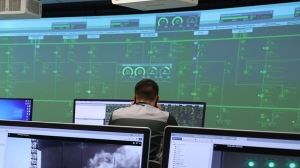Belarus, Russia to develop cooperation in training nuclear energy specialists

MINSK, 3 November (BelTA) - Approaches to developing workforce capacity in the nuclear power industry were discussed in Minsk during a visit of representatives of Rosatom to Belarus, BelTA learned from the communications department of the state corporation.
The Russian delegation comprised specialists of Rosatom Technical and Corporate Academies and Rosenergoatom. They got familiar with the material base of the training center of Belarusian NPP: a full-scale simulator of a central control panel and training rooms for operating personnel with local simulators of different systems. The parties considered possibilities for further cooperation in personnel training and exchange of experience of the instructor personnel.
The discussion of human resource development for the benefit of the nuclear industry continued at a meeting at the Energy Ministry. The working meeting was attended by heads of the ministry, Belenergo management company, BelNPP, and leading Belarusian universities. Deputy Energy Minister Mikhail Mikhadyuk thanked representatives of the Russian side for their support in the development of nuclear energy in the country and cooperation in a wide range of areas in this area. “At this stage one of the key issues of safe operation of the nuclear power plant is a timely and high quality training of national staff, the formation of a strategy for the development of workforce capacity for the nuclear power industry. In this regard the Russian experience is of high importance to us. We count on support and cooperation in this important matter,” he said.
Yulia Uzhakina, Director General of Rosatom Corporate Academy, spoke about the ecosystem of human resources development in the Russian nuclear industry. “Rosatom has formed a special philosophy of talent development, which means the creation of an entire ecosystem. We are building a system where a talented person will want to come on his/her own and where he or she will be able to discover all his/her talents. Rosatom has a comprehensive approach at all stages: from early vocational guidance for school students and personnel training at colleges and universities to continuous development of current employees and work with great professionals of retirement age,” she said.
According to Yulia Uzhakina, a large-scale comprehensive program for the development of Rosatom's management talent pool is run to train leaders. It includes modules dedicated to strategic thinking, marketing, leadership, team management and change management. The number of participants who have joined the management talent pool since its formation has reached some 6,000. An estimated 1,000 new managers join the program each year.
Specialists of Rosatom Technical Academy presented information on experience of training personnel of nuclear facilities for the industry, including projects of construction and operation of nuclear power plants abroad. “Rosatom Technical Academy has accumulated enormous experience and competence in the field of training personnel for foreign NPPs. At present, the academy's employees are training personnel for Rooppur NPP (Bangladesh), Akkuyu NPP (Turkey), and El Dabaa NPP (Egypt). Since 2018 we have been closely cooperating with our Belarusian partners in training the personnel of Belarusian NPP. More than 800 specialists have been trained so far in the key areas of nuclear plant operation,” Yuri Seleznev, Rector of Rosatom Technical Academy, emphasized.
Head of the Russian delegation, Director of Rosenergoatom Personnel Training Department Grigory Khakhulin supported proposals of his Belarusian counterparts in terms of setting up a training system for the Belarusian NPP personnel on the basis of the training center. “In order to develop a balanced system and training programs for operating personnel and managers, it is advisable to conduct a preliminary analysis of the plant's capabilities and documentation in order to develop recommendations. In this regard, I support the idea of conducting a partner audit and, based on its results, identifying priority steps and approaches for further work on developing a systematic approach to training. We have a lot of experience in this part and we are ready to join in this work very quickly,” he said.
The participants of the meeting agreed to set up a joint coordinating group to implement the outlined tasks.













